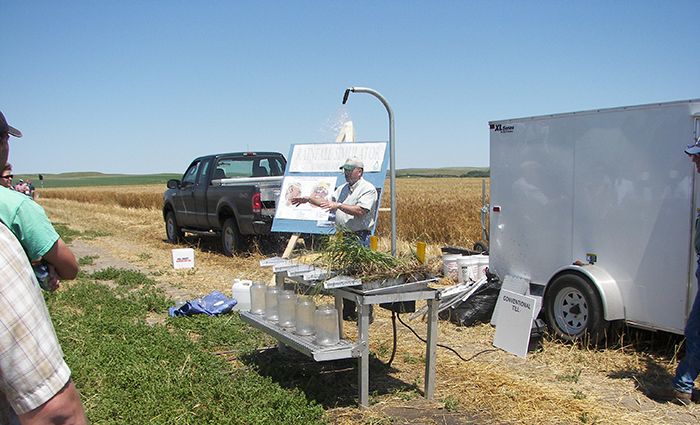By some estimates, 80 percent of a farmer’s operating costs can be traced to the use of fossil fuels. The Dakota Lakes Research Farm is working to reduce that number – and not by a modest 10, 20 or even 50 percent. The farm hopes to be fossil fuel neutral by 2026.
 This is a world-class research farm owned by producers in the Pierre area. Many of our customers have worked with the farm’s staff and manager, Dr. Dwayne Beck at South Dakota State University. They’re always impressed with the research and work being done at Dakota Lakes farm.
This is a world-class research farm owned by producers in the Pierre area. Many of our customers have worked with the farm’s staff and manager, Dr. Dwayne Beck at South Dakota State University. They’re always impressed with the research and work being done at Dakota Lakes farm.
Dr. Beck is a proponent and practitioner of no-till farming, which he credits with not only increasing the farm’s yields but also cutting its use of fossil fuel by half.
Tilled ground consumes a lot of energy – from the machinery used to turn up the soil to the nitrogen that needs replenishing to the irrigation that quenches ground less able to retain water. No-till practices haven’t fully eliminated the farm’s reliance on nitrogen fertilizer or irrigation. But Dr. Beck has plans to close the gap with help from nature and technology.
Here’s a look at some of the farm’s energy plans:
- Solar power: A new maintenance building on the farm was constructed to be as air-tight as possible and insulated with generous amounts of soybean-based foam. Electric boilers heat the fluid for an in-floor hydronic heating system, and energy consumption this winter has been about a third of what the farm was told to expect from a more traditional structure. Next year, the farm plans to use solar panels to heat the building. It also will use solar to cool the building in the summer.
- Livestock: The farm hopes to re-introduce cows and other animals to provide a natural cycle of fertilizer nutrients. Feeding livestock cover-crops, crop residues and other on-site products keeps nutrients on the farm. This is more energy efficient than hauling the farm’s grain and cattle to a feedlot. It also reduces the cost of buying nitrogen fertilizer, a significant energy hog. (Producing 150 pounds of nitrogen fertilizer uses the energy equivalent of 30 gallons of diesel fuel.)
- Biofuels: A cold-press allows the farm to turn some of its oilseed crops -- soybeans, flax and canola – into high quality oil, as well as protein meal for livestock. The farm uses some of the oil to heat office and classroom areas. The oil also can be sold on the commodity market and to plants that make biodiesel. Dr. Beck hopes that, like European farmers, he will one day transfer oil straight from his cold press to his tractor, further reducing the farm’s reliance on fossil fuels.
Everybody theorizes about what it will take to run a green -- or zero-net energy -- farm. Dr. Beck offers at least one certainty: “It will take less of the stuff you buy and more thinking and more management.”

